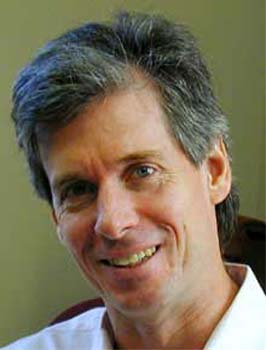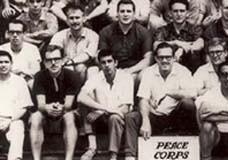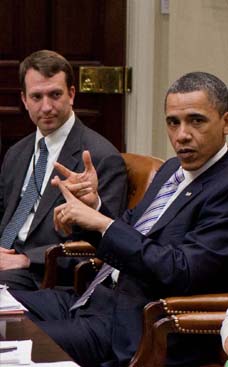
"Since its inception, the Peace Corps has had an overarching mission of promoting friendship and peace with three specific inter-related goals, one relating to advancing human development through meeting the needs for trained manpower and two related to promoting understanding of other peoples and cultures. This mission and these three goals are as relevant today as they were when the Peace Corps was created. I also think that they are likely to be relevant for the next 50 years. I believe, as apparently Sargent Shriver did, that ultimately the so-called Third Goal of bringing the volunteer experience back home may be the most important goal of all of these. Unfortunately, the Bringing the World Back Home Goal has received the least resources, averaging less than one percent of the agency's annual budget these past fifty years. While it is understandable that the Peace Corps has focused its resources on recruiting, training, and supporting volunteers in as many countries requesting the Peace Corps as possible, this underresourcing of this essential goal deprives the American people from benefitting as they might from the volunteers' international service experience. Without knowing more about the understandings garnered from volunteers' service and the results that volunteers achieve at home and abroad, it may be increasingly difficult to secure the needed financial support in these especially challenging financial times."
Testimony of NPCA President Kevin Quigley: "Peace Corps: The Next Fifty Years"
Testimony of Kevin F. F. Quigley
Senate Foreign Relations Committee
Subcommittee on Western Hemisphere, Peace Corps and Narcotic Affairs
October 6, 2011
Chairman Menendez and Ranking Member Rubio, I am honored to testify before this committee regarding the Peace Corps and its next fifty years.
My name is Kevin F. F. Quigley, and I am President of the National Peace Corps Association (NPCA). Founded in 1979 and headquartered in Washington, D.C., NPCA is the nation's leading 501(c)(3) nonprofit organization supporting Returned Peace Corps Volunteers and the Peace Corps community through networking and mentoring to help guide former Volunteers through their continued service back home. It is also the longest-standing advocate on behalf of the Peace Corps and its values of service and understanding.
I was privileged to serve my country as a Peace Corps volunteer in Thailand for three years between 1976 and 1979, teaching English in a secondary school and later at a teachers' training college in the Isaan or Northeast region of that country.
As we come to the end of a remarkable year-long celebration of the 50th anniversary of the Peace Corps, this is a timely and important hearing. This year-long celebration was designed with two book-ends echoing the remarkable inception of the Peace Corps: 1) the spark lit at the University of Michigan by then Senator John F. Kennedy on October 14, 1960 leading to the establishment of the Peace Corps by Executive Order on March 1, 1961, and 2) the passage of the Peace Corps Act less than a year later on September 22, 1961.
These 50th anniversary events were designed so that anyone, anywhere who valued the Peace Corps could have a chance to participate. We succeeded in unprecedented ways: more than 1.3 million individuals participated in anniversary events in more than 80 countries and all 50 states. Besides commemorating 50 years of service and friendships and encouraging the next generation of volunteers, this golden anniversary year was built on a key principle: it should not simply be about celebrating the accomplishments of the past, but rather this anniversary year should advance the work of the Peace Corps in striving towards a more prosperous world in peace.
On September 22nd, 2011 we organized one of the principal anniversary activities, 50 years to the day after the signing of the Peace Corps Act. On that day, we invited Returned Peace Corps Volunteers (RPCVs) to meet with members of Congress and their staff to share stories and discuss why the Peace Corps still matters. More than 500 community members participated. As part of that effort, we collected letters from the participants. Here, I'd like to provide a few brief excerpts that discuss what the Peace Corps has accomplished.
Peter and Linda Dahm, River Falls, WI, Micronesia (1973-1975)
"We strongly feel that volunteers make a difference. As volunteers, we started an export company for an agricultural product and that company lasted almost twenty (20) years… Our experience has led us to a lifetime of commitment to our communities and our country. Currently, for example, Peter serves as the volunteer Chair of our City Housing Authority. Linda remains active nationally and internationally with the Girl Scouts among other activities."
~~
Susannah Hopkins Leisher, Millburn, NJ, Nepal (1985-1987)
"Peace Corps made a fundamental difference to my life's path. It was the first step in what has turned out to be, so far, a 20-year career working to alleviate global poverty. I brought the Peace Corps-founded knowledge of the realities of poverty to ten years living and working in Vietnam, later carrying these lessons with me to West Africa and Central America during my recent five-year stint with Trickle Up, A New York City-based non-profit dedicated to reducing extreme poverty. The lessons of Peace Corps have enriched my service with many povertyfighting organizations in many countries. The American taxpayers' modest and long-ago investment in my training and years of service has, I do believe, paid off many-fold."
~~~
Nick and Bay Bancroft, Medfield, MA 02052, India (1966-1968)
"We are two constituent who served two years in the Peace Corps in India from 1966-1968: Nick in small industry development (working in cast iron foundries and machine shops making irrigation equipment, as India modernized its sugarcane processing), and Bay in Nutrition and maternal/child health programs in the schools and villages of our town… … We returned to the U.S. with a visceral understanding of how life and people are the same wherever you go, although their circumstances, for better and worse, are different from ours in different ways… For a miniscule cost (compared with the cost of other U.S. agencies involved in U.S. foreign relations), Peace Corps volunteers fulfill their hard assignments, become fluent in the hard language, make strong connections with "real" people from the world's developing nations, and return to the United States inspired and seasoned by their experience."
~~~
Sharon Keld, Southhampton, New York, Morocco (2006-2008), Philippines (2009-2010), Armenia (2011)
"I found that, to a person, every Muslim Moroccan who I met was pro-American and liked Americans- and on September 11, 2011, I reminded friend and family back home that that was the case." ~~~ Wayne L. Haag, Saginaw, MI, Guatemala (1962-1964)
"As the U.S. must continue to adapt to an ever changing world, full of many challenges, the Peace Corps has left us better prepared to identify and/or create win-win situations, thus reducing conflict. I have been pleased over the years to see a growing number of U.S. Government and international staff positions occupied by people with Peace Corps backgrounds. America's voluntary efforts, including the Peace Corps, set examples for the rest of the world to emulate, encouraging growth in international voluntary efforts. At home, RPCVs often use their experiences gained abroad, to strengthen domestic voluntary efforts."
So, much like this hearing today, a key goal of this anniversary year was generating ideas and resources to prepare the Peace Corps for an even more successful and impactful next 50 years. This included the NPCA working together with the University of Michigan and the Brookings Institution to organize a national symposium on the future of international service in Ann Arbor, Michigan in October 2010. Last month, on September 21st, we released the results of the largest independent nationally representative survey of Returned Peace Corps Volunteers (RPCVs). I now ask that the survey results and an accompanying report, "A Call to Peace," be entered into the hearing record.
Remarkable Results from our "A Call to Peace Survey"
This unprecedented independent survey with 11,138 respondents sought to explore why individuals volunteered, how they assess their experiences, and what impact it had on their lives and careers. This survey provides remarkable confirmation that Peace Corps volunteer service does lead to a lifetime of service, with RPCVS volunteering at twice the national average, improving communities at home and abroad.
Let me briefly summarize three general findings from our just-released survey:
1. Waging Peace as the Overriding Purpose of the Peace Corps: The Peace Corps experience has a profound effect on fostering peace and understanding among Americans and people around the globe (Peace Corps's Goal #2 and 3), with significant but somewhat less effect in meeting the need for trained workers in those countries (Goal #1). More than 80 percent said their service was effective in promoting a better understanding of Americans in the communities where they served and an almost equal number said their service helped promote a better understanding of others at home. Fifty-nine percent said their service was effective in helping other countries meet their need for trained workers.
2. A Transformative Experience: The Peace Corps experience is transformational for volunteers–an experience they would strongly recommend to their families; often changed the rest of their lives; and made them better citizens back home. Ninety percent of RPCVs rated their Peace Corps experience as excellent or very good, and a stunning 98 percent would recommend the Peace Corps to their child, grandchild or other close family member. 3. Unfinished Business: President Kennedy said that the Peace Corps would be serious when 100,000 Americans served abroad every year. Since today there are only 8,600 learning new languages, understanding other cultures and leading to a more informed U.S. foreign policy that means we have a long way to go to realize the vision of its founders. To fulfill Kennedy and Shriver's dream, the ServiceWorld coalition was formed. This coalition, with more than 300 colleges, employers, and nonprofit organizationss, has rallied around an agenda to send 100,000 Americans abroad annually through three channels: the Peace Corps, which the RPCVs surveyed want to see doubled; Volunteers for Prosperity, which currently sends 43,000 highly skilled volunteers each year to work on urgent issues such as HIV/AIDS and malaria in Africa; and new Global Service Fellowships that would tap up to 10,000 Americans for up to one year of service, with Members of Congress nominating outstanding individuals from their districts and states, much like they do for the military academies.
Strengthening the Peace Corps for Its Next 50 Years
Fifty years into its history, the world is dramatically different than when the Peace Corps was first established. The world is more urbanized, globalized and connected through technology, although there is a growing number living in poverty without access to health care, education or the means to have a life of dignity. There are many countries that would like a Peace Corps program and many Americans who are willing to serve, but we simply do not have the resources to meet this demand.
Since the Peace Corps was created, there has been a proliferation of international service programs. This includes approximately 20 countries that have Peace Corps-type government international volunteer programs. A number of regional organizations like the European Union (EU) and the Association of Southeast Asian Nations (ASEAN) are developing their own volunteer programs modeled on the Peace Corps. Increasingly universities and corporations are developing international volunteer programs as central to their educative and business missions. There are literally thousands of different options to volunteer internationally, varying in length of time, location, and application requirements. Given these myriad options, the Peace Corps faces intense competition for volunteers--a competition that is only likely to increase in the decades ahead.
Our recent survey also explored various ideas about how the Peace Corps could improve during its next half century. Generally, there was a strong sense that there were unprecedented new opportunities for the Peace Corps to cooperate with other programs and organizations. Some of these ideas to strengthen the Peace Corps include:
- There was an overwhelming consensus that the Peace Corps should do more to document the impact of its work.
- There was also a strong consensus that the Peace Corps should not change its 27-month model, which includes three months of training followed by two years of service. RPCVs understand better than anyone that integration within the host community and the lengthy tenure of Peace Corps volunteer service is qualitatively different from other international volunteer programs.
- This overwhelming support for the 27-month program model was not, however, to suggest that the Peace Corps should not change. Rather, to meet changing circumstances in a dynamic and unpredictable world, the survey respondents suggested that the Peace Corps should develop a broader network of highly substantive partnerships with other volunteer sending programs including non-governmental organizations, universities, corporations and/or other federal agencies. In this way, the Peace Corps could better meet the need for more highly-trained but shorter-termed volunteers. In recent years, the Peace Corps has made progress in developing these partnerships, especially through PEPFAR (The President's Emergency Plan for AIDS Relief).
- Many of these ideas to strengthen the Peace Corps harken back to the ideas of the Peace Corps' visionary founders, Sargent Shriver and Harris Wofford. They envisioned that there would be multiple channels for delivering high quality volunteer programs and that a self-administered government program was just one of those program delivery channels. The survey respondents endorse using multiple channels to deliver international service efforts.
Maintaining Support of the American People
Since its inception, the Peace Corps has had an overarching mission of promoting friendship and peace with three specific inter-related goals, one relating to advancing human development through meeting the needs for trained manpower and two related to promoting understanding of other peoples and cultures. This mission and these three goals are as relevant today as they were when the Peace Corps was created. I also think that they are likely to be relevant for the next 50 years. I believe, as apparently Sargent Shriver did, that ultimately the so-called Third Goal of bringing the volunteer experience back home may be the most important goal of all of these.
In response to a congressional request, the Peace Corps completed an internal assessment and a strategic plan in June 2010. There are numerous good ideas contained in that plan. Like the Congress, the Peace Corps community is keenly interested in learning more about progress made in executing that plan, especially on an ongoing basis.
For the Committee's consideration, I suggest four ideas to strengthen the Peace Corps in its next half-century:
1. Provide more support for Bringing the World Home. Unfortunately, the Bringing the World Back Home Goal has received the least resources, averaging less than one percent of the agency's annual budget these past fifty years. While it is understandable that the Peace Corps has focused its resources on recruiting, training, and supporting volunteers in as many countries requesting the Peace Corps as possible, this underresourcing of this essential goal deprives the American people from benefitting as they might from the volunteers' international service experience. Without knowing more about the understandings garnered from volunteers' service and the results that volunteers achieve at home and abroad, it may be increasingly difficult to secure the needed financial support in these especially challenging financial times.
2. Align Country Selection More Closely with Long-term National Interests. Developing programs with countries that are more clearly related to our long-term national interests is critical to securing ongoing support. The Peace Corps' recent annual portfolio review is an important step in the right direction. However, this portfolio review needs to weigh more heavily strategic countries important to our long-term interest and for them, in particular, develop innovative partnership approaches. These long-term interests pertain to U.S. economic, political, security and cultural interests around which there is bipartisan support. For example, these interests would include deepening the Peace Corps presence in predominantly Muslim countries and "rising global powers." For a variety of reasons, the Peace Corps has not had programs in countries of growing stature internationally, such as Brazil, India and Nigeria for decades-perhaps in part because the Peace Corps succeeded there. The Peace Corps currently has only modest programs with two of the world's most populous countries, China and Indonesia. Developing programs with these rising global powers, which may involve working jointly in third countries or perhaps having bilateral programs where Americans volunteered there and citizens of these countries volunteered here, could be extremely important to advancing our long-term national interests. Peace Corps-type programs in and with these rising countries, or with other countries that have "graduated" from Peace Corps programs, such as Korea, might also create innovative co-financing possibilities.
3. Revitalize the National Advisory Council. Established by the Peace Corps Act, the Peace Corps National Advisory Council is an advisory committee appointed by the President with the advice and consent of the Senate. In recent years, this Council has been moribund. In his FY 2012 budget request, President Obama indicated that he intended to revitalize this Council. He said that, "The council is also charged with making recommendations for the purpose of guiding the future direction of the Peace Corps and of helping to ensure that the purposes and programs of the Peace Corps are carried out in ways that are economical, efficient, and responsive to changing needs of, and relationships with, the countries and peoples being served." Revitalizing this Council could help fulfill the purpose of this hearing. I urge that this Committee and the Senate push for a revitalization of the National Advisory Council.
4. Routinely Share Information with 0rganizations Promoting the Peace Corps' Mission. As long as the Peace Corps continues to focus the preponderance of its resources on recruiting, training and supporting volunteers (goals #1 and #2) leaving scant resources for bringing the world home efforts (goals #3), the best way for the Peace Corps to address this Third Goal is through extensive and substantive partnerships with RPCVs organizations. In addition to the NPCA and its network of 146 formally organized member groups, there are numerous other RPCV organizations that are working to help measure the impact of volunteer service and assist with bringing these volunteer experiences home in ways that strengthen communities at home and abroad. The government agency now interprets that the Peace Corps Act precludes sharing information with outside organization without the express consent of the Appropriation Committees. That presumption should change. I urge this Committee's assistance in ensuring that organizations that promote the Peace Corps mission and values have regular and routine access to the information necessary to accomplish this. Chairman Menendez, these are just a few ideas and recommendations on how the Peace Corps could be strengthened in ways that enhance its capability to make significant progress in advancing its timeless goal of a prosperous world at peace over its next 50 years. I would be glad to address any questions or comments that you or other Committee members have.
Thank you very much.
















